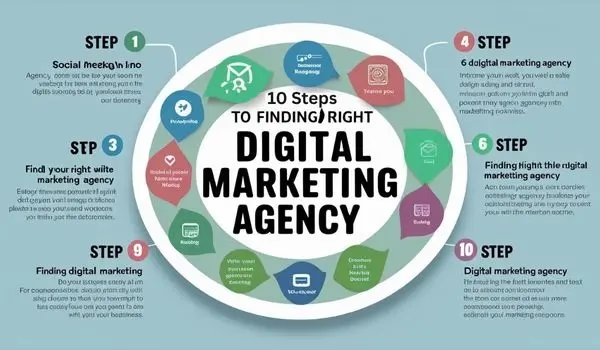10 Steps to Find the Right Digital Marketing Agency

In a world that revolves around screens, every company—no matter its size or sector—must command the digital stage. A gorgeous website or a few lively social-media posts won’t cut it by themselves anymore. To keep pace with the competition, organizations need strategic digital marketing that draws in customers, boosts brand visibility, and ultimately lifts the bottom line. This is precisely the advantage offered by skilled right digital marketing agency.
The real hurdle, however, isn’t whether you can find a digital marketing agency. It’s whether you can find the right one. With agencies numbering in the thousands, a misstep can mean burning budget on cookie-cutter tactics, yielding modest results, and forfeiting valuable chances. Yet a well-matched partner can supercharge growth, nurture loyal customers, and deliver results you can track and measure.
This guide lays out ten clear, actionable steps for selecting the digital marketing agency that fits your business. Whether you’re launching your first product or steering a well-established brand, following these steps will give you the clarity and confidence you need to make the best choice.
10 Best Skills Learning Social Media Marketing
10 Steps to Find the Right Digital Marketing Agency
Step 1: Pinpoint Your Business Goals
Before you look for an agency, write down what you want to achieve. Do you need more website visitors, bigger brand presence, more leads, higher sales, or stronger customer loyalty? Each goal calls for different marketing tactics.
- Brand Awareness: Social media, content marketing, and public relations.
- Lead Generation: Search engine optimization (SEO), pay-per-click (PPC), and strong landing pages.
- Sales Growth: Email marketing, conversion rate optimization, and remarketing.
When you know your goals, you can shortlist agencies that do the work you need.
Step 2: List the Services You Really Need
Digital marketing covers a million options, and not every company is a master of them all. Some firms do SEO best; others offer the full mix, including branding and analytics. Make a list of the services that will help you reach your goals.
Core Services to Consider:
- Search Engine Optimization (SEO)
- Pay-Per-Click (PPC) Advertising
- Social Media Marketing
- Content Marketing
- Email Marketing
- Conversion Rate Optimization (CRO)
- Influencer Marketing
For example, if your site is getting zero traffic, partnering with an agency that excels at SEO might be your best choice. Want to see results within days? Pay-Per-Click ads could get you there much faster.
Step 3: Research Potential Agencies
Now that you know what you need, it’s time to find the right agency. Search for companies with solid experience in your specific industry. Start with a Google search, browse LinkedIn, check industry directories, or ask your network for recommendations.
Look for:
- Case studies that show measurable results
- Client testimonials and reviews
- Experience in your industry
- Relevant certifications (like Google Partner, HubSpot, or Facebook Blueprint)
Create a shortlist of at least 5 to 7 agencies that meet these criteria.
Step 4: Observe Their Digital Presence
Would you hand your budget to a web design agency that has a clunky website? Probably not. Apply the same logic to any digital marketing agency: their own website, social media, and content should showcase the skills they offer you.
Look for:
- Website Quality: Is the site easy to use, loads quickly, and is it designed for search engines?
- Blog & Content: Do they share helpful, well-written articles?
- Social Media: Are they posting regularly and responding to comments?
- Search Rankings: Do they show up for keywords that matter in their field?
If the agency can’t sell itself, it probably can’t sell your business either.
Step 5: Review Their Portfolio and Case Studies
A trustworthy agency shares examples of their work and provides detailed case studies. Look for indicators that matter to your business. If possible, find studies from your own industry or from business models like yours.
Metrics to Examine:
- Traffic Growth: Look for specific percentage increases.
- Lead Generation: Check the number of leads generated.
- Conversion Rates: See how well those leads turned into customers.
- ROI: Confirm that the return on investment is clearly stated.
Case studies serve as the agency’s resume.
Step 6: Check Their Team Expertise
The quality of the agency’s staff is key. Ask if they have experts in SEO, content writing, design, pay-per-click, and analytics. A well-rounded team reduces the risk of relying on one person’s skills alone.
Does the agency have certified SEO and PPC specialists?
Is their content team trained to weave storytelling into branding?
Do they have data analysts dedicated to monitoring and interpreting campaign results?
Are they keeping pace with the latest AI marketing innovations?
A varied team is more likely to offer solutions that look at the whole picture.
Step 7: Examine Their Pricing Structure
Pricing is never one-size-fits-all in the digital marketing world. Some agencies bill by the hour, others charge a monthly retainer, and a few go by a project fee. Know exactly what each charge covers and see whether it fits your budget.
Here are common pricing options:
- Hourly fees: Works best for one-off or quick projects.
- Monthly retainer: Suited for sustained campaigns that need regular attention.
- Performance-based: You pay based on results, like the number of new leads or sales.
Keep in mind that the lowest price often leads to the lowest quality. Look at your return on investment instead of the sticker price.
Step 8: Examine Communication and Openness
Clear communication is what keeps the client-agency partnership running smoothly. Notice how they respond in the very first meeting. Are they open about their strategies, timelines, and fees?
- Will they share regular performance reports?
- Are they honest about the obstacles that may crop up?
- Do you have a dedicated account manager?
- Do they use project trackers like Asana, Trello, or Slack?
An agency that practices transparency is one that’s worth keeping around for the long haul.
Step 9: Dig Into Tools and Tech
Good digital marketing runs on data, and the right tech stack helps you put that data to work. Without the proper tools, campaigns can flop, so ask what the agency uses for key tasks like SEO audits, keyword research, advanced analytics, automation, and regular reporting. Don’t be shy—this info is crucial.
Must-Have Tools Include:
- Google Analytics and Search Console for traffic and health insights
- SEMrush, Ahrefs, or Moz for in-depth SEO analysis
- HubSpot, Marketo, or Mailchimp for marketing automation
- Hootsuite or Buffer for social media scheduling
Agencies that keep their software updated are usually delivering fresher, more accurate campaigns.
Step 10: Ask for a Trial or Detailed Proposal
Before you ink a long deal, ask for either a detailed proposal or a small trial project. This way, you get to watch their tactics in real time, testing their creativity, strategic thought, and execution.
A Solid Proposal Should Include:
- A strategy written just for your objectives
- A timeline with milestones
- Defined KPIs and metrics so you know what success looks like
- A transparent pricing layout
If the trial or proposal adds value, that agency is worth a long-term deal.
Online Masters Degree Digital Marketing
Conclusion
Finding the perfect digital marketing agency isn’t just about the biggest or the cheapest quote. It’s about teaming up with a group whose knowledge, honesty, and enthusiasm match your business goals. Stick to the 10 steps in this guide to lower your chances of making a mistake and boost your results.





